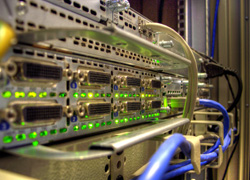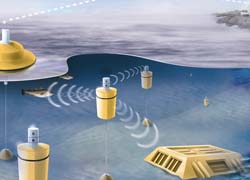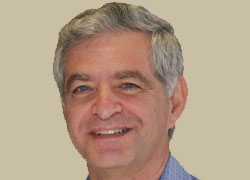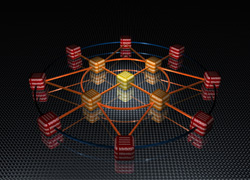IMDEA Networks

Event Category: External Presentation (External Speaker)
Handoff Prioritization Schemes and TDMA Scheduling in Wireless Networks
Handoff is a key element in the wireless cellular networks in order to provide Quality of Service (QoS) to the users and to support users’ mobility. Handoff failure will result in the forced termination of an ongoing call. From the user’s point of view, the service of a handoff request is more important, as the forced termination of an ongoing call is more annoying than the blocking of new calls. Therefore, in order to support QoS to the users and to provide ubiquitous coverage, the handoff procedure should be further investigated. The aim of this lecture is to provide a comprehensive survey of the basic elements, the different types and phases of the handoff procedure.
Read more arrow_right_altEnergy-Efficient Wireless Access Networks
Energy efficiency is one of the great technological challenges of our times. Recently, the concerns for the environmental consequences of the huge rate with which energy is consumed is leading to the awareness that electricity consumption and waste should be reduced in all sectors. The ICT (Information and Communication Technology) sector makes no exception, since it is becoming a major component of the worldwide energy consumption budget.
Read more arrow_right_alt
Content centricity as central paradigm in Content Networking
The concept of Content Networks (CN) has extended Content Distribution Network (CDN) research in order to also comprise other aspects beyond delivery optimization. One central element of this research is the recognition that users are ultimately interested in the content (or a piece of information) and not any specific copy. This resulted in research on content addressing that allows general content access, i.e., the goal is retrieving content (or information) rather than routing of packets between end hosts. This is called Content-Centric respectively Information-Centric Networking (CCN/ICN). For some time these concepts have been explored for the better provision of and access to content services.
Read more arrow_right_altAddressing resource issues in new live video streaming systems
The delivery of live video streams over the plain old best-effort Internet is a major challenge. This talk deals with the issue of under-provisioning in the main delivery platforms, i.e. when the equipments that are in charge of delivering the video do not have enough upload capacity to serve all clients.
Read more arrow_right_altProtocol design issues in Underwater Acoustic Networks
Interest in underwater acoustic networking research has grown rapidly in the past few years. Fundamental differences between underwater acoustic propagation and terrestrial radio propagation call for new criteria for the design of communications systems and networking protocols. In this talk, we will provide an overview of the main challenges posed by the underwater acoustic propagation environment, with special emphasis on networking and protocol design issues, and provide novel insights that are useful in guiding both protocol design and network deployment. We will then address in more detail some specific examples of how the unique features of underwater propagation and acoustic modems affect protocol design. In particular, we will (1) focus on the energy consumption profile of acoustic modems and its impact on the design of topology control mechanisms and on the trade-off between sleep cycles and wake-up modes, and (2) present a novel energy-efficient routing protocol for underwater networks that explicitly accounts for the relationship between hop distance, bandwidth, and energy consumption.
Read more arrow_right_altFrom a national leadership to the World Championship. Lessons learned from Telefónica's internationalization process
This presentation intends to extract some useful hints on how to successfully manage an internationalisation process. It is focused on the specific case of a Spanish very large company: Telefónica, the leading Spanish telecommunications operator and one of the Top Ten telcos in the worldwide ranking by market cap nowadays.
Read more arrow_right_altNetwork Reliability in the Software Era - Finding Bugs in OpenFlow Applications
Nowadays users expect to experience highly dependable network connectivity and services. However, several recent episodes demonstrate that software errors and operator mistakes continue to cause undesired disturbances and outages. Software-defined networking (SDN) is a new kind of network architecture that decouples the control plane from the data plane - a vision currently embodied in OpenFlow. By logically centralizing the control-plane computation, SDN provides the opportunity to remove complexity from and introduce new functionality in our networks. On the other hand, as the network programmability enhances, risks arise that buggy software in network controllers may disrupt an entire network.
Read more arrow_right_altOptimizing the use of regenerators in optical networks
The placement of regenerators in optical networks has become an active area of research during the last years. Given a set of lightpaths in a network G and a positive integer d, regenerators must be placed in such a way that in any lightpath there are no more than d hops without meeting a regenerator. In the talk I present a few optimization problems that arise within this framework. This is done by considering two cases: a. The cost function is the total number of regenerators placed at the nodes
Read more arrow_right_altAuctions of Licensed vs Unlicensed Use of Spectrum
Auctions have regained interest from researchers due to its different new applications (Google AdWords auctions, cloud computing auctions, privacy auctions, and white spaces spectrum auctions). In this work in particular we explore auctions for spectrum that can be allocated either to a single bidder (for licensed use) or to a collection of bidders (for unlicensed use).
Read more arrow_right_altInsights on Distributed Backup and Storage
While a considerable amount of research has been devoted to peer-to-peer backup and storage, no such system actually became widely adopted in the wild. My take on this is that there is the opportunity to build better, and possibly more successful, systems: while some design issues (e.g., erasure coding and data indexing) have been well explored, others have been barely scratched.
Read more arrow_right_alt











Recent Comments